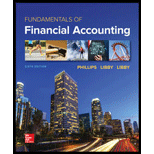
Define the following:
- a. Asset
- b. Current asset
- c. Liability
- d. Current liability
- e. Common stock
- f.
Retained earnings
To define: The meaning of (a) assets, (b) current assets, (c) liability, (d) current liability, (e) common stock, and (f) retained earnings.
Explanation of Solution
(a) Asset: Assets refer to the resources owned by the business, which are utilized in the course of the business to generate revenue.
(b) Current assets: Assets of an organization which can be liquidated within a period of one year, is termed as current asset.
(c) Liability: Liability is an obligation of the business to pay to the creditors in future for the goods and services purchased on account or any for other financial benefit received.
(d)Current liability: Current liability is the liability, which has to be paid within a year or within the end of fiscal year, whichever is earlier.
(e) Common stock: The amount invested in the business by an investor in exchange of shares, and receives a return or share of profit from the profits earned by the business, is known as common stock.
(f) Retained earnings: Retained earnings are the portion of earnings kept aside by the business for the purpose of reinvestments, payment of debts, or for future growth.
Want to see more full solutions like this?
Chapter 2 Solutions
Fundamentals Of Financial Accounting
- Can you solve this general accounting problem using accurate calculation methods?arrow_forwardPlease explain the solution to this general accounting problem using the correct accounting principles.arrow_forwardGoodwill is an example of an indefinite-life intangible asset, meaning that public companies must test it for impairment rather than regularly amortizing to systematically reduce its value on the balance sheet of the public company. Can anyone recap the difference between limited-life versus indefinite-life intangible assets? Any specific examples of either category?arrow_forward
 College Accounting, Chapters 1-27AccountingISBN:9781337794756Author:HEINTZ, James A.Publisher:Cengage Learning,
College Accounting, Chapters 1-27AccountingISBN:9781337794756Author:HEINTZ, James A.Publisher:Cengage Learning, Cornerstones of Financial AccountingAccountingISBN:9781337690881Author:Jay Rich, Jeff JonesPublisher:Cengage Learning
Cornerstones of Financial AccountingAccountingISBN:9781337690881Author:Jay Rich, Jeff JonesPublisher:Cengage Learning

